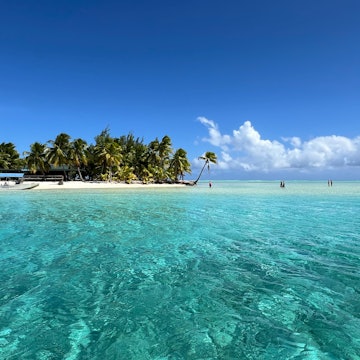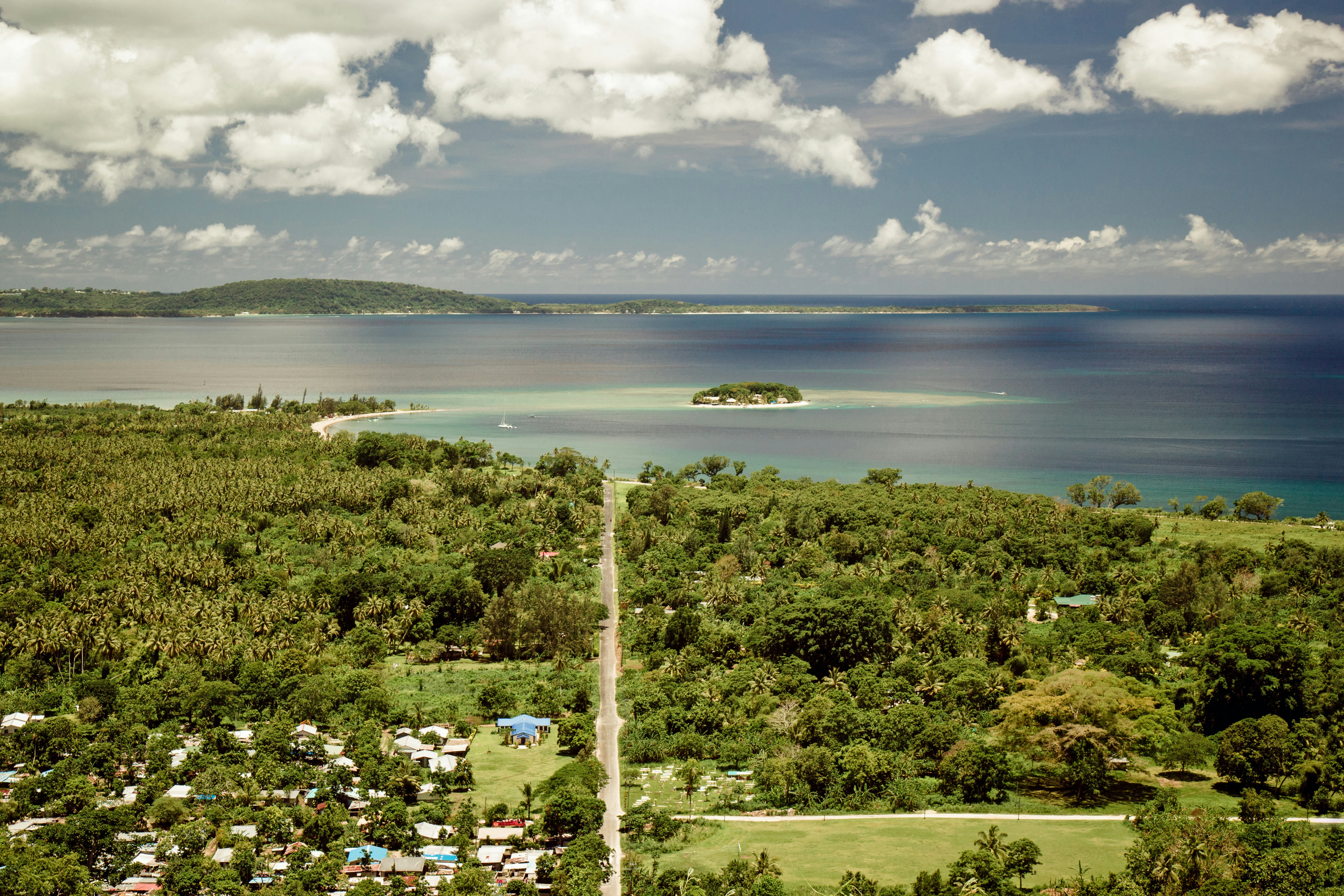

Champagne Beach in Vanuatu, said to be one of the South Pacific's finest © Peter Unger / Getty Images
Jungle-cloaked islands, rich kastom (traditional) cultures, blockbuster scuba diving and a remarkably accessible active volcano are just a small part of the allure of Vanuatu, an 80-plus island archipelago made for adventure.
With only a fraction of visitors to Vanuatu venturing beyond the cruise ship port and family-friendly resorts of the capital Port Vila ("Vila" to locals), this sparsely developed South Pacific nation offers more intrepid travelers the now-rare opportunity to experience natural attractions and cultural experiences untouched by mass tourism. Slip on your swimwear and dive in.
Vanuatu is one of the best countries to visit next year. See our full list of Best in Travel 2025 winners.

When should I go to Vanuatu?
Vanuatu’s dry season, from late April to September, is the most popular time to visit, but with just 45,000 tourist arrivals per year, even the main island of Efate doesn’t feel crowded during the high season. Budget travelers may uncover more accommodation deals in the October-to-March low (wet) season, with trade-offs including higher humidity and an increased risk of tropical storms and cyclones. Increased rainfall during the wet season can also impact underwater visibility in some destinations, yet diving is generally good year-round across the archipelago.
Most of Vanuatu’s festivals are held during the dry season. Visit Pentecost Island on a Saturday between April and June to take in the ancient naghol (land diving) ritual that inspired modern bungee jumping; the Maskelyne Islands in July for the two-day Maskelyne Canoe Race and Arts Festival; and Ambrym Island, also in July, for the Lylywy Cultural Festival showcasing Vanuatu’s unique Rom dance.
How much time should I spend in Vanuatu?
For travelers seeking an easy family holiday or budget-friendly getaway, a week away (including flights) at a Port Vila area resort should fit the bill. For travelers keen to venture beyond Efate, allow around nine days plus international flights for a relaxed two-island itinerary, especially if you plan on doing some diving, or two-to-three weeks to visit additional islands.
Is it easy to get in and around Vanuatu?
The main international gateway to Vanuatu is Bauerfield International Airport on Efate, 5km (0.6 miles) outside of Port Vila. The domestic terminal is adjacent to the international terminal. Airlines with direct flights to Vanuatu include Air Calédonie, Aircalin, Fiji Airways, Jetstar, Solomon Airlines, Quantas, and Virgin Australia.
Taxis service the airport route, and minibuses operate in Port Vila. There’s no fixed schedule or routes – tell the driver where you want to go and they’ll let you know when you get there. Buses also run in Luganville on Espiritu Santo island, on northeast Malekula Island, and on Tanna Island. Central Port Vila and central Luganville are also easy to get around on foot.
It’s possible to travel between some of Vanuatu’s larger islands by ferry, but the journeys can be long and rough, and services can be unreliable, prompting most visitors to take domestic flights instead.

Top things to do in Vanuatu
Strap on a dive tank and explore the reefs and wrecks of Efate, Espiritu Santo, Tanna and beyond. The immense wreck of the SS President Coolidge off Espiritu Santo is widely considered to be one of the world’s best wreck dives, while Tanna’s twin set of blue holes and ethereal Blue Cave are also accessible to snorkelers.
Perch on the rim of Tanna’s Yasur volcano at sunset as lava spews up from the crater below.
Spend a day exploring Efate’s collection of dreamy natural pools and waterfalls including the Blue Lagoon, Mele Cascades and Lololima Falls, or dive into the handful of idyllic blue holes of Espiritu Santo.
Travel to Pentecost Island to watch "land divers" jump off wooden towers up to 30m (100ft) high, with tree vines wrapped around their ankles.
Experience the thrill of swimming alongside wild dugongs in Gapsard Bay on south Malekula Island.
Be mesmerized by the UNESCO-listed tradition of sand-drawing, which can be observed at the National Museum of Vanuatu in Port Vila.
My favorite thing to do in Vanuatu
As an adventurous traveler and a keen scuba diver, Tanna Island ticks all the boxes for me. I love that you can spend a morning exploring the beautiful and blissfully crowd-free reefs on this remote island with Volcano Island Divers (attached to White Grass Ocean Resort & Spa, it’s Tanna’s only dive center), then head out on a bumpy afternoon road trip to the Yasur volcano to feel it rumble beneath your feet before it belches fountains of lava. There’s also a fun hike to a serene waterfall, kastom villages to visit, and some of Vanuatu’s best sunsets to savor.
How much money do I need for Vanuatu?
You can buy a cup of kava for as little as VT100 (less than US$1), but expect prices for accommodation, restaurant meals and scuba diving to be similar to those in more developed Oceania nations such as Australia. Factor in domestic flight costs for multi-island itineraries.
Cash remains king throughout Vanuatu, especially beyond the resorts of Port Vila, so be sure to stock up with plenty of vatu at the airport or in Port Vila before traveling to outer islands where ATMs and currency exchange services are harder to find. For domestic flights, a provincial departure tax of VT200 is not included in tickets and must be paid at the airport prior to departure. Tipping is not customary.
Average costs include:
Basic room for two: VT5000–8000
Double room at a resort: VT17,000–24,000
Lunch at a local market: VT500–600
Main meal at a restaurant: VT3000–4500
Bottle of beer at a bar: VT500
Scuba dive: VT10,000
Bus ride in Port Vila: VT150
Taxi ride in Port Vila: VT500
Taxi from international airport to Port Vila: VT2000

Pack a well-stocked first aid kit
You’ll find pharmacies, a hospital and Vanuatu’s only hyperbaric chamber (to treat scuba divers with decompression sickness) in Port Vila, but with medical services in much shorter supply beyond the capital, it pays to be prepared to treat minor travel health issues. A stash of adhesive bandages, wound dressings, antiseptic wipes and antibiotic ointment is useful for stemming infections from cuts and scrapes. Consult a travel health doctor about other medications worth bringing – they may recommend a course of broad-spectrum antibiotics to help fight off a bout of traveler's diarrhea or an unexpected urinary tract infection.
Embrace local cuisine
Revolving around fish and root vegetables, traditional ni-Vanuatu cuisine is simple and wholesome. And tucking in at local markets is a lot cheaper than dining at international restaurants, where flavors and cooking techniques from around the world are fused with local produce including seafood, tropical fruits and Vanuatu beef.
Go easy on the kava
Known for its muscle relaxing and sedative effects, kava, a beverage made from the root of the kava (Piper methysticum) plant, is widely consumed for ceremonial purposes and recreational use across the Pacific. Many believe that Vanuatu kava is the strongest, so if you’re planning to imbibe, keep in mind that one coconut-shell cup can be enough to prompt a nap.
Pick up a local SIM at the airport
Wi-fi can be unreliable or non-existent beyond the resorts of Efate. If you’re going to need regular internet access during your trip, pick up a SIM at the kiosk in the arrivals hall of the international airport; the Vodafone network generally offers better coverage in the outer islands. Limited digital SIM options can be found online.
Choose souvenirs wisely
Seashell jewelry and other products are a common sight at Vanuatu’s markets, but with a crucial role to play in marine ecosystems, the best types of seashells are seashells left in their natural habitat. Similarly, it’s worth reading up on Vanuatu’s endangered tree species before purchasing wood carvings. Check kava import rules in your onward destination, where there may be restrictions.
Lean into island time
Nothing happens in a (huge) hurry in Vanuatu. Keep smiling, go with the flow, and discover how relaxing it can be.
Avoid eating big fish
Ciguatera fish poisoning, a foodborne illness caused by eating reef fish contaminated with ciguatoxins, is a small risk in Vanuatu. The best way to avoid it is to avoid eating large fish (over 2.7 kg/6lbs) – check with your server when ordering.
Pack lightweight clothing
While it can be useful to have a sweater on-hand for breezy evenings, as well as long pants to protect against bugs and prickly plants on walking trails, Vanuatu’s warm year-round climate calls for light, comfortable clothing.
Is Vanuatu safe?
Crimes against travelers in Vanuatu are rare, and locals are generally very welcoming and hospitable.










